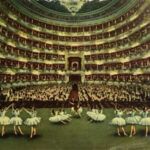1 PM Performance with commentary by Emanuele Senici; with Aubrey Allicock, bass-baritone; Teresa Buchholz, mezzo-soprano; Allegra Chapman '10, piano; César Delgado, tenor; Steven LaBrie, baritone; Theo Lebow, tenor; Cecilia Violetta López, soprano; Anna Polonsky, piano; Erika Switzer, piano
Works by Giacomo Puccini (1858–1924), From Edgar (1888)(Fontana); Amilcare Ponchielli (1834–1886), From I Lituani (1874) (Ghislanzoni); Antônio Carlos Gomes (1836–1896), from Il Guarany (1870) (Scalvini and D'Ormeville); Ruggero Leoncavallo (1857–1919), from Zaza (1900) (Leoncavallo), from La boheme (1896) (Leoncavallo); Alberto Franchetti (1860–1942), from Germania (1902) (Illica); Francesco Cilea (1866–1950), from L'arlesiana (1897) (Marenco), from Adriana Lecouvreur (1902) (Colautti); Umberto Giordano (1867–1948), from Fedora (1898) (Colautti), from Madame Sans–Gene (1915) (Simoni); Italo Montemezzi (1875–1952), from L'amore dei tre re (1913) (Benelli); and Riccardo Zandonai (1883–1944), from Francesca da Rimini (1914) (T. Ricordi), Giuseppe Verdi (1813–1901), from Falstaff (1893); Giacomo Puccini (1858–1924), from Suor Angelica (1917), Sogno d'or (1912), From La rondine (1917)
It was after walking 20 miles to see a performance of Aida as a teenager that Puccini first recognized opera as his calling, and the figure of Verdi would continue to loom large throughout his career. The older composer was widely considered the supreme master of Italian opera, and for some his death signaled the genre's decline. For most, though, it was a question of who from the younger generation would inherit his crown, and although that honor was soon ceded to Puccini, at first he was thought to have many rivals. Bard presents selected arias and ensembles from operas by Puccini and his contemporaries Leoncavallo, of Pagliacci fame; Italo Montemezzi, who synthesized Italian lyricism with Wagnerian orchestrations and Debussian instrumental color; Francesco Cilea and Umberto Giordano, respective composers of repertory mainstays Adriana Lecouvreur and Andrea Chénier; Alberto Franchetti, a Jewish nobleman known as the "Meyerbeer of modern Italy"; Riccardo Zandonai, composer of Francesca da Rimini; and Brazilian-born Antônio Carlos Gomes, the only non-European to succeed in the golden age of Italian opera.

